What Does Christian Speculative Fiction Do With Jesus?
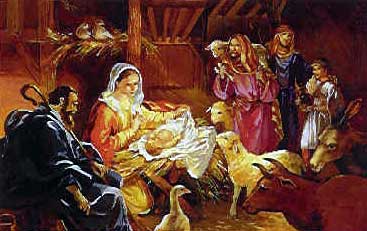
At Christmas when we celebrate Jesus making His appearance here on earth, it seems appropriate to look at how He makes an appearance in Christian speculative fiction.
I’ve read any number of Christian fantasies that include a god figure or perhaps even God Himself. For example Donita Paul’s DragonKeeper Chronicles identifies the God of that world as Wulder; Karen Hancock’s Guardian-King series names God as Eidon, and Sharon Hinck’s The Sword Of Lyric series calls Him, the One.
What I don’t recall as easily is a representation of Jesus.
Clearly C. S. Lewis created the most memorable representation of Jesus in his Narnia series in his character Aslan. But other stories don’t seem to include Jesus as clearly. Should He be as He is in reality, but given a different name? Should He be absent, since in the fantasy world, God (by whatever name He’s given) deals with those people in different ways? Or is the story perhaps mirroring the world before Christ came? Or should He appear with His own name, as the Jesus we know, revealed in Scripture?
The issue of Jesus in fiction can create problems. On one hand stories that seem allegorical run into readers’ attitudes toward a story dependent upon that literary device. On the other hand, stories that do or don’t include Jesus in some form face theological scrutiny. The former must conform to the reality of Scripture and the latter must deal with the absence of God’s means of reconciling humankind to himself.
I thought it would be interesting to look at a variety of Christian speculative stories, some self-published, some traditionally published, and see what the authors did with Jesus. I sent out a survey to a few authors which included questions about God and about the Holy Spirit, but today I’m focusing on Jesus.
Some authors chose to include an allegorical character that represents Jesus. Some chose to show him by utilizing a type or types—“a person or thing symbolizing or exemplifying” Christ (like King David was a type of the one-day-returning-and-reigning King, Jesus). Some decided, for a variety of reasons, not to have Jesus in their stories. The specific question the authors answered was, “Do you have a character representative of Jesus in your story? If so, who?”
First the ones that would be most nearly considered allegorical.
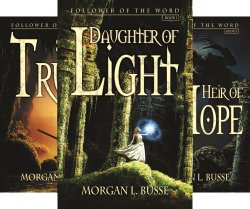 Morgan Busse, in her fantasy Follower of the Word series:
Morgan Busse, in her fantasy Follower of the Word series:
Yes. He is known as the Word, the one who spoke the world into existence and continues to speak, thus holding the world together. I also borrowed from the old story The Rag Man and instead of a divine character dying for mankind, the Word takes on a character’s darkness which leaves a scar on his body.
R. J. Larson in her fantasy The Infinite series: Prophet, Judge, King, Exiles, Queen, DownFallen, Valor.
Obliquely, referred to as, “the Promised One” and “the High Priest.”
Yvonne Anderson in her “soft sci-fi” four-book series Gateway to Gannah:
Not a Christ figure, but Christ, who is called the Yasha, which means “the Redeemer” in the language of Gannah.
Sharon Hinck in her fantasy The Sword Of Lyric series utilized both an allegorical representative, though future, and types:
Yes –- there is a promise of a coming “Deliverer” throughout the people’s history. While they wait for Him, the One sends various Restorers. Just as old-testament judges and prophets and kings were “Christ-types” — giving hints at the role of the Messiah to come, the Restorer’s are a forerunner to the Deliverer.
C.E. Laureano‘s Celtic series The Song of Seare:
Lord Balus, who plays the same role in the world’s salvation message as Jesus does in our world.
Keanan Brand‘s high fantasy duology The Lost Sword, consisting of Dragon’s Rook and the yet to be published Dragon’s Bane:
There will be [a Jesus figure] in history/holy writ in the second book: A prince who has to outward reason to do so will step into a plague-riddled war and take onto himself the ills of the people.
Christopher Miller in the middle grade fantasy Codebearers Series:
Jesus: Aviad
Other authors use a type. This is the approach J. R. R. Tolkien took, I believe. He showed Christ as the sin-bearer in Frondo who bore the One True Ring to Mount Doom. He showed the resurrected Savior in Gandalf. He showed Christ as the soon and coming king in the character of Strider, also known as Aragorn.
Here are the survey answers from authors who more or less brought Christ into their stories through the use of a type.
In Patrick Carr‘s high fantasy series The Staff And Sword and in the new Darkwater Saga:
In The Staff and the Sword, Jesus is symbolized by my main character, Errol. Errol is an appropriate name because it means wanderer and in the story, Errol never gets to stay in one place until the very end. I wrote it this way with the verse “but the Son of Man has no place to lay his head” in mind. In addition, in each book, I made sure the consequences of other people’s sins (mistakes) ended up on Errol’s shoulders. I also tried to make him as human as possible. But this explanation would be incomplete without talking about Liam. While Errol represents Christ in his first incarnation, Liam represents him in his second. Thus the incredibly appropriate title of the series “The Staff and the Sword.” Errol’s preferred weapon of choice was the staff, symbolizing Christ in his first coming, while Liam was a master of the sword without equal, symbolizing Christ when he returns. This dual representation of Christ also helps to explain the very end of the trilogy.
In The Darkwater Saga, Jesus is represented by my main character, Willet, though in a much less overt way.
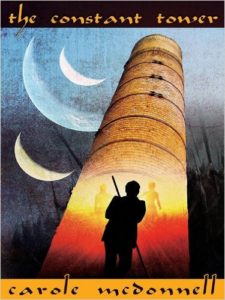 In Carole McDonnell‘s fantasy The Constant Tower:
In Carole McDonnell‘s fantasy The Constant Tower:
Yes. My character Psal. Psal is not exactly Jesus but he is a Firstborn who is despised and rejected of men. I wanted to have the savior of his people, and indeed the savior of the world, be someone who had nothing in him that others would praise. He also had to be prophetic in that he would argue against the falsity he found among his own clan. And of course he would be an unsuspected destined one.
Scott Appleton‘s The Sword of the Dragon series and Neverqueen:
There is no physical representative of Jesus in the series as of yet, in a literal sense that is. A trinity of prophets work in the real world of my series. A dragon, an invisible creature, and a shepherd. They are a type of allegory but not directly. It was my intention that they reflect the character of God as he directs them in the world.
Rachel Starr Thompson in her various fantasies, classic, contemporary, and historical, respectively The Seventh World Trilogy, The Oneness Cycle, and The Prophet Trilogy:
Only in The Seventh World Trilogy, where . . . the Christ figure is the King. In my other stories there are characters who take on messianic qualities or works, but I wouldn’t call them representative of Jesus particularly.
Perhaps the most interesting use of types is Stever Trower‘s in his science fiction Countless as the Stars:
Being a retelling of an Old Testament story, there is no Jesus as such, unless you consider some of the angelic appearances in the OT (such as the ‘three visitors’ in Genesis 18) to be a pre-incarnate Christ. This angelic messenger role is taken in my story by the mysterious Lex — whose name is a not-so-subtle nod to the Word become flesh (John 1:14).
L. B. Graham in his fantasy series The Binding Of The Blade utilized “type” in a unique way:
Yes [there is a Christ figure] & No. There is no Trinity, no God incarnate on earth, no true picture of the 2nd member of the Trinity. On the other hand, the notion of “self-sacrifice,” of laying yourself down to ‘redeem,’ of the great but paradoxical idea of ‘strength that stoops to conquer’ so that in surrender to death a great victory is won, then yes, there are character(s) that represent Jesus, the most notable of which is a prophet named “Benjiah,” who lays his life down to win the ultimate victory.
Nadine Brandes in her Out of Time Series (book one, A Time to Die and book two which released in October, A Time to Speak) takes a similar approach:
I don’t really have a Jesus figure, but there is a character who represents some aspects of Christ the way a flawed human should do. His name is Jude.
A third category of stories includes Christ as He is.
Bryan Davis in all his stories, most fantasy, some science fantasy, and one dystopian:
In most of my stories, Jesus is the real Jesus. He is on-screen twice in brief appearances. All other references are by verbal mention.
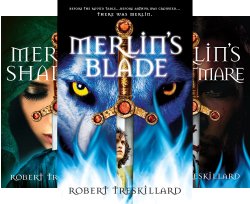
Robert Treskillard in his historical fantasy books about Merlin:
Because I’m writing historical fiction with fantasy elements, I’m able to actually speak about God, Jesus, and the Holy Spirit using their normal names, though sometimes I do use Latin. I do have to be careful to try to write from the perspective of the early-Celtic church, however.
Only Spec Faith’s own Shannon McDermott and Christy-award winner Jill Williamson reported that they do not have a representative of Jesus. Shannon’s series is The Valley of Decision, and Jill’s is The Kinsman Chronicles, specifically Darkness Reigns. She explained:
I do not [have a representative of Jesus]. This story loosely parallels Ancient Judah and Israel when “the kings did evil in the eyes of the LORD.”
In contrast, Karen Hancock has used multiple methods of bringing Jesus into her stories: allegorically and as He has revealed Himself. In her science fiction stand alone, Arena, the character Mr. C was an allegorical representation of Christ. In the Guardian-King series, Tersius was a Jesus figure. In her science fiction stand alone, Enclave she took a different approach:
THE ENCLAVE, of course, is straight science fiction set in our world. God, Jesus and the Spirit all appear as Themselves. 😉
What do you think? Which method do you prefer or do you like speculative fiction without any representation of Jesus?
I might also mention that the Spec Faith library has most, if not all, of these authors in our listings, so you can find specific titles and read introductions and perhaps reviews of their books.


































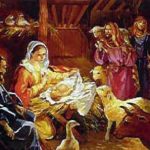

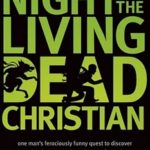




I’m not sure I prefer one over the other. I think it has a lot to do with the context of the story.
That said, in my Reality series, God is called God, and Jesus is Jesus (though he doesn’t directly come into the story–Sisko attends a Christmas service in one place). But on the other hand, Jesus is also symbolized both in Sisko as a type and His presence in the ring that “wedded him to God.” Sisko even has a dying and resurrection event happen at the end of the first book, though not the same as Christ (he doesn’t come back glorified like Gandolf did). More like Lazarus.
I don’t know if people noticed, but in the second book of that series (Reality’s Ascent) while Sisko always prayed to the Father when calling for God’s help, Kaylee addresses her prayers to the “Lord” when she inherits the ring.
On another note, in an unpublished book set in the same world, Jesus makes an appearance though his name is never mentioned, but it is obvious who He is. So He eventually will appear as Himself.
Since the Reality world is a parallel time line to our own, it has some similarities to our own as well as differences, both in events and the relational time period for those events. So it made sense to keep the same names and to a large extent, religious practices as our world experiences them.
If it was a totally unconnected fantasy world from our own, like some you’ve mentioned, it would make more sense to use different names for God and Jesus since it would be highly unlikely they would have the same names as we do, or even the same time line for Jesus’ appearance in that world. So it depends on the context, whether it fits or not, to me.
Good point, Rick. Setting does dictate a writer’s approach, though not entirely. Robert Treskillard indicated that when he said he needed to stay within the understanding of God true to his historical setting.
I’ve read at least one fantasy set in a pretend world that includes God as God. I’m trying to remember which one, but my mind has drawn a blank.
Becky
I wonder if Christ figures are rarer than simple God figures in fantasy because they are so specifically Christian. Some notion of “God” exists in many religions and worldviews. You can include a God in your fantasy story without stepping on too many toes (depending, of course, on how vaguely you portray His nature). But a clear Christ figure, on the other hand, marks your story as specifically Christian, not Muslim or deist or pantheistic or anything else. Including a Christ figure may also lead readers to think that you’re trying to write an allegory, in a way that a simple God figure doesn’t. (This reader, at least, starts suspecting allegory when she notices a Christ figure but doesn’t if the author includes a God.)
In my own work, I often try to include parallels to Christ, but avoid straightforward Christ figures that are incarnated as humans, live perfect lives, die, are resurrected, etc. That’s already been done many times by far more skillful authors. If I can, I’d like to go at it from a different angle and focus on other aspects of who Jesus is and what His place is within the Trinity.
That’s a really good point, Sheesania. When Christ shows up, there’s little in doubt about the worldview, and even about the trajectory of the story (which is why J. K. Rowling didn’t want readers to know about her affiliation with the Anglican Church).
But I see few writers presenting a sinless savior in their stories. The ones that do include Christ by another name seem to put him into place after he came and sacrificed—sort of an equivalent of the times we’re living in, though the world might be more medieval.
Maybe that’s because C. S. Lewis portrayed Christ so perfectly in Aslan that most writers don’t want to try something like it—sort of what you said about your own writing.
Anyway, it’s interesting to see what other writers have done, I think. Thanks for adding to the discussion.
Becky
I guess it depends on the story and the skill of the writer, but I generally really dislike an allegorical story. To me it often comes across as clunky and as “trying too hard” to make a fantasy book “Christian”. It’s tough, to be sure. Which is one of the reasons why I chose to do historical fantasy, so I didn’t have to make up a religion which is “Christian-like”. I admire the authors that try to do that, but it’s hard to do well, I think. It is much easier to include a God-figure than a Christ-figure, because, as sheesania says, that makes the story much more universal for readers.
For me, the drawback of an allegory is that I know where the story is going before it goes there. A skillful writer (John Bunyan, for example, and C. S. Lewis) can pull it off and keep my interest, but I don’t readily pick up books that are specifically allegories. When I do read them, though, I actually like them.
Most novels today aren’t straight allegories, of course, though some use allegorical characters.
You’re right about lots of fantasies including god, whether or not the book is Christian. Religion is generally part of culture and therefore part of the worldbuilding, but authors can put much or little emphasis on that aspect, depending on their bent.
I think it’s interesting to see the diversity of the books mentioned in the post.
Becky
I like fictional representations of Christ IF (and only if) they are done well. Those are few and far between.
My favorite fictional Christ figure is from Kathy Tyers’ “Daystar,” the final book of her Firebird series – I was surprised he didn’t make the list! He was almost a direct portrayal of Christ, just with a different name and under slightly different circumstances. I loved him because He made me think about how human and down-to-earth Jesus really was. It made me reflect more on His human nature, and really affected the way I think about the true Jesus, in that it made my perception of Him richer and more tangible to me. The only thing I disliked was how she handled his death and resurrection in that sci-fi setting. But I loved his portrayal as a person.
In my main WIP the characters are contemporary Christian young adults, so they pray to the true Jesus, who is in heaven with the Father, as He is now. 🙂 The same goes for my secondary WIP, although that one is set in the distant future in our universe. I do have a fantasy story tucked away for later where a Christ figure will appear as a powerful wizard who is the only one who can save characters that have essentially been zombie-fied and had their souls displaced. I think that will be a powerful symbol, and I’m looking forward to writing that.
I have to quibble slightly with Mr. Carr’s use of the word “incarnations” about Christ… Christ was incarnate *once*. He will COME twice, but He is still a man incarnate now, and will continue to be the man He became in His first and only incarnation. 🙂 Perhaps it was just a wrong word choice, but I thought it worth mentioning. Words matter! Especially when speaking of the Word Himself. 🙂 (Loved the first book of that series, though! This reminds me to read more! But I never would have guessed Errol was a Christ figure…since he starts out as a drunk I thought of him as the one being redeemed. But maybe I need to read more to see it.)
Fascinaring post! I enjoyed reading it. 🙂
Hi, Bethany, thanks for your feedback. I only read Kathy Tyers’ first book, so missed the Christ figure there. Too bad. I wanted to include more science fiction.
Patrick’s “incarnations” bothered me at first, too. But he said Errol was representative of Christ in His first incarnation—when He came to earth as the Suffering Servant—while Liam represents Him as the soon-and-coming King. So the “incarnations” he’s referring to are the same two you’re thinking of—His first and His second coming, one fulfilled, one yet to take place.
Becky
I’m rereading the Warrior Kind by Stanton as my Christmas present to myself. He has the whole Trinity, radical conversions, spirit-filled power, and much more within an outrageous epic scifi fantasy. http://words-of-action.com/a-warriors-redemption/
A Warrior’s Redemption, Book #1
Exciting fiction told from the heart and meant to take you on a journey to new realms and settings of imaginative…
WORDS-OF-ACTION.COM
This is a challenging topic to address! Especially because there are so many different opinions about what should and shouldn’t be represented into Christian fiction. Speculative Faith has already done an excellent job bringing up discussions about whether or not Christian stories should be considered allegories and whether or not Christians must include such elements within their works. The way I see it, no matter what you do, you’re going to get flack from somebody. Even C.S. Lewis gets heat for using figures from Greek mythology in his stories. 😉 Not to mention all the hating on the 1930s-1940s British school system.
I don’t care if the book includes Christ or not, and I give authors a lot of slack on their interpretation, because daring to do anything featuring Christian faith is HARD, and there are plenty of critics and theologians ready to shred things already. What I care about is that the author sticks to their vision/version and is consistent in their worldview. Without that, the whole story will fall flat.
Actually, these discussions are why I don’t write ‘Christian fiction.’ Too many options and choices to consider. I tell stories, and then my faith naturally slips through in sacrificial themes and metaphors, because I can’t help it. My contemporary epic fantasy series includes a prophecy and a prophet from a quasi-Christian religion (with all the trimmings), but I also have atheists, agnostics, animists, a pagan, and other things in there. And no, they aren’t all converted. The overall plot centers on the protagonists overthrowing a corrupt world system, and while their faith anchors them, they struggle with it, and the story isn’t centered around an allegorical message. Instead, it’s more like important figures out of history who worked with others to accomplish goals (like Martin Luther King Jr. or William Wilberforce or the like). This probably comes out of my own love of history and cultures. There are so many vibrant stories of action. 🙂